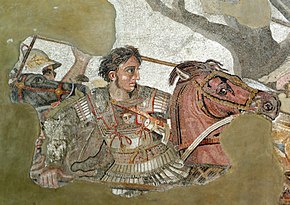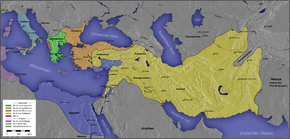Alexander the Great
![]()
This article is about the Macedonian king. For the Spanish-American monumental film, see Alexander the Great (1956).
Alexander the Great (Ancient Greek Ἀλέξανδρος ὁ Μέγας Aléxandros ho Mégas) or Alexander III of Macedonia (b. 20 July 356 BC in Pella; † 10 June 323 BC in Babylon) was king of Macedonia and hegemon of the Corinthian League from 336 BC until his death.
Alexander extended the borders of the empire, which his father Philip II had established from the previously rather insignificant small state of Macedonia and several Greek poleis, to the Indian subcontinent through the so-called Alexander campaign and the conquest of the Achaemenid Empire. After his invasion of Egypt, he was hailed there as Pharaoh. Not least because of his great military successes, Alexander's life became a popular motif in literature and art, while Alexander's assessment in modern research, as in antiquity, is ambivalent.
With his accession to power, the age of Hellenism began, in which Greek culture spread over large parts of the then known world. The cultural imprints of Hellenization survived the political collapse of the Alexander Empire and its successor states and continued to have an effect in Rome and Byzantium for centuries.

Alexander in the thick of battle, detail of the famous "Battle of Alexander" (mosaic, Pompeii, ca. 150-100 B.C., probably after a 4th century model)
Historical outlook
After Alexander's death, loyalty to his family, which could not provide a successor fit to rule, proved very limited. Although the claim to inheritance of his feeble-minded half-brother and also that of his posthumous son was initially recognized, this arrangement did not last. His mother Olympias of Epirus, his wife Roxane, his son Alexander IV, his illegitimate son Heracles, his sister Cleopatra, his half-sister Cynane, her daughter Eurydice and his half-brother Philip III Arrhidaios met a violent death.
Instead of the members of the previous Macedonian royal dynasty, Alexander's commanders took power as his successors (Diadochi). Since none of them was strong enough to assert himself as sole ruler, a long series of civil wars ensued in which power was vied for in changing coalitions. In the course of the diadochal wars, the vast empire was divided into diadochal kingdoms. Three of these empires proved permanent: that of the Antigonids in Macedonia (until 148 BC), that of the Seleucids in the Near East (until 64 BC), and that of the Ptolemies in Egypt (until 30 BC). Alexander left behind numerous newly founded cities, many of which bore his name; the most important was Alexandreia in Egypt.
Alexander's cultural legacy consisted of the increased or now just beginning Hellenization in the Alexander Empire or its successor empires. The so-called Hellenism had a lasting impact on the ancient world, especially in the eastern Mediterranean and the Near East, for centuries to come.

The Diadochian Empires after the Battle of Ipsos 301 BC.
See also
- Alexander Mosaic
- History of Hellenism
- Alexander (film)
- Alexander (lunar crater)
Questions and Answers
Q: Who was Alexander the Great?
A: Alexander the Great was the king of the Ancient Greek kingdom of Macedon from 336 BC until his death in 323 BC. He was a great military leader.
Q: When and where was Alexander born?
A: Alexander was born in 356 BC in Pella, the ancient capital of Macedonia.
Q: Who were Alexander's parents?
A: Alexander's parents were Philip II, King of Macedonia, and Olympias, the princess of neighboring Epirus.
Q: What did Alexander do during his childhood?
A: During his childhood, Alexander watched his father turn Macedonia into a great military power, and watched him win victory on the battlefields in the Balkans.
Q: What language did Alexander the Great speak and what culture did he spread?
A: Alexander the Great spoke the Greek language and he spread the Greek culture throughout Asia.
Q: Who was Alexander's personal tutor, and what did he teach him?
A: Alexander's personal tutor was the Greek philosopher Aristotle, who taught him rhetoric and literature, and stimulated his interest in science, medicine, and philosophy.
Q: What became important in Alexander's later life?
A: The training in science, medicine, and philosophy that Alexander received from Aristotle became important in his later life.
Search within the encyclopedia